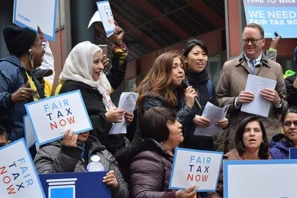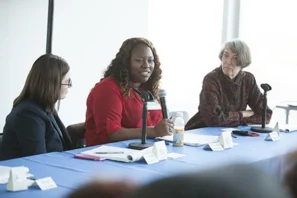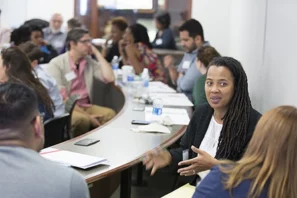We lead the fight for economic and racial justice by litigating, shaping policy, and training and connecting people in the advocacy community.

We don’t just fight for communities affected by poverty—we work alongside them, advocating for solutions that are informed by their lived experiences.

We convene and connect advocates, community leaders, and activists across the country so they can share ideas, resources, and get the tools they need.

We build the capacity and skills of equal justice lawyers and activists to champion economic and racial justice in their fields.
From litigating and shaping policies in Illinois to training and convening multi-state networks of public interest attorneys, we work with and for the communities we serve to make equal justice and economic opportunity a reality.
Illinois must fund progressive revenue solutions in light of the reconciliation bill’s massive cuts to social programs.
The federal budget reconciliation bill passed in the House today and is on its way to be signed by the president. It’s the worst attack on our nation’s social safety net since “welfare reform,” the sweeping budget cuts and eligibility restrictions enacted in 1996.
Illinois’ 2026 budget was a crucial test of the state’s willingness to fight the ongoing federal attacks on our social safety net and the basic rights of our residents. Unfortunately, lawmakers failed to deliver a bill to protect Illinois from potentially devasting cuts to Medicaid and other essential programs that support low-income families.
The Shriver Center wants to build a future free from poverty and racism. Read insights from our experts and advocates about the fight for racial and economic justice.
Audra Wilson took over as president and CEO of the Shriver Center five years ago this month. In her essay, Audra reflects on her tenure, which began as two transformative forces collided in real time: the COVID pandemic and the George Floyd uprisings.
Aysa Gray, the Shriver Center’s racial and economic justice trainer, says that in times of political backlash, advocates need to understand the roots of structural racism and learn the tools to combat it. In a recent conversation, Aysa explains how the Shriver Center’s trainings meet the moment.
On the day we commemorate Dr. King’s life and legacy, we rarely confront and discuss his most stinging criticism of America’s grossest injustice: how could a country of such great wealth have so many of its citizens trapped in vicious cycles of poverty?
As the season of gratitude begins, we’re reminded of the strength and importance of our amazing community of leaders, advocates, grassroots activists, and beyond. Erin Dowland Kabwe, the Shriver Center’s vice president of development, profiles the Community Memorial Foundation, a critical partner that funds necessary work in the pursuit of health and racial equity.

67 East Madison Street, Suite 2000
Chicago, IL 60603
phone: 312.263.3830
|
Shriver Center on Poverty Law to Sunset the End of 2025 |
